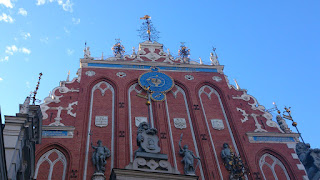マラソンの後、ヴィルニュスからバスでリガへ。そこで2泊する。旧市街はユネスコの世界遺産に登録されている。リトアニア、ラトビアとエストニアを合わせてバルト三国とよく言われるが、これではこの三つの国が同じようなものだと勘違いしてしまうかもしれない。でも歴史を振り返れば明らかに違いがある。正直そのような知識を持ち合わせていなかったが、来るときの飛行機で読んだ歴史の本でその違いをよく理解できたように思う。
Not many Austrian know well about these countries. People would rarely chose to travel toward North. Estonia is well known by skype, or IT industry or e-government. But other two?
オーストリア人でもバルト三国についてよく知っている人は多くない。旅行先として選ぶ人も少ない。エストアニアはSkype、IT産業や電子政府としてよく知られているが、他の2つの国は?
Before arriving at the bus terminal in Riga, our bus traveled along the wide Daugave river, which told me that the sea is very close. Going up this river, it runs through the northern part of Belarus, and then into Russia: until about 300km west of Moscow. This city grew and was developped as German marchantes settled in, as a trading hub from Baltic sea to Russia. In the old ceter there are lots of old German churches or buildings. I felt as if I were in the old city center of Frankfurt.
リガのバスターミナルに着く前に、バスは幅の広いダウガヴァ川に沿って走り、海が近いことが分かる。この川を遡っていくとベラルーシの北端を通り、そしてモスクワの300kmほど西まで向かう。この町はその昔ドイツ人商人が移り住んで大きくなったところで、バルト海からロシアへの中継点として発達してく。旧市街の中心部には、ドイツらしい教会や建物が並ぶ。フランクフルトの旧市街に居るかのような錯覚を覚える。
 |
| House of Blackheads |
Compared to Vilnius, Riga is more gorgeous and may attract more tourists. Very specious and there are lots of restaurants or cafes around the churches. There is also a district in the city where there are lots embassys and in art nouveau style. It was stunning.
ヴィルニュスに比べ、リガは豪華で観光客をより惹きつけるような魅力がある。広々としており、教会のまわりにもたくさんのレストランやカフェが並ぶ。町の一角には各国大使館が存在する、アールヌーヴォー様式の建物がたくさん並んでいるところがある。これは圧巻だ。
After that, Riga was under Poland, and then Sweden, and then to Russia, until the WWI. Riga was the very important Russian city to deliver European culture, architecture and technology to Russia. The reason that number of Russian is high in the city is followings: during the WWII Soviet conquered Lativia and lots of Latvian was killed or sent to Siberia. In Riga there was infrastructure from the Russian time, then Soviet let many Russian settled in the city.
その後、リガはポーランド、そしてスウェーデン、それからロシアに支配され、第一次世界大戦になる。リガはヨーロッパの文化、建築、技術をロシアに運ぶための大事なロシアの街だった。今リガにたくさんのロシア人がいるのも、第二次世界大戦でソ連が攻め込み、多くのラトビア人が死んだり、シベリア送りになった。リガにはロシア時代のインフラが残っており、少なくなってしまった労働者を補うためにロシア人を移住させたことが原因のようである。
Near the St.Peter's church I found a beer restaurant, I sat outside and enjoyed live music. On the day, a gipsy band played and was great. A waiter asked me, if I am Japanese, so I asked him how to say this or that in Latvian. In Lithanian it is quite easy to say "thank you", it is "aciu" and you would say when you sneeze.
Latvian is completely different. "Liels paldies" Maybe easy to pronounce, we can read each letter as it is. As same as in Lithuania, many Russian visit this city but would never say liels paldies. Waiters/waitress seemed happy to hear that.
聖ペテロ教会の近くにビアレストランを見つけたので、外にすわって生演奏を楽しむ。その日はジブシーバンドが素晴らしい演奏をしてくれた。ウェイターが日本人かと聞くので、逆にラトビア語ではあれやこれはなんていうのと質問攻めにした。リトアニア語ではありがとうは覚えやすい。風を引いたときに言うかもしれない”アチュー”。ラトビア語は全く違う。”リエルス バルディエス”。アルファベットをそのまま読めばいいだけだからそれほど難しくはない。リトアニアでもそうだったが、たくさんロシア人が観光に来るが一言すらもラトビア語を話そうとはしないらしい。ウェイターやウェイトレスはラトビア語のありがとうを聞けてうれしそうだった。
 |
| St.Peter's Church |
 |
| brown, red and blond |


No comments:
Post a Comment